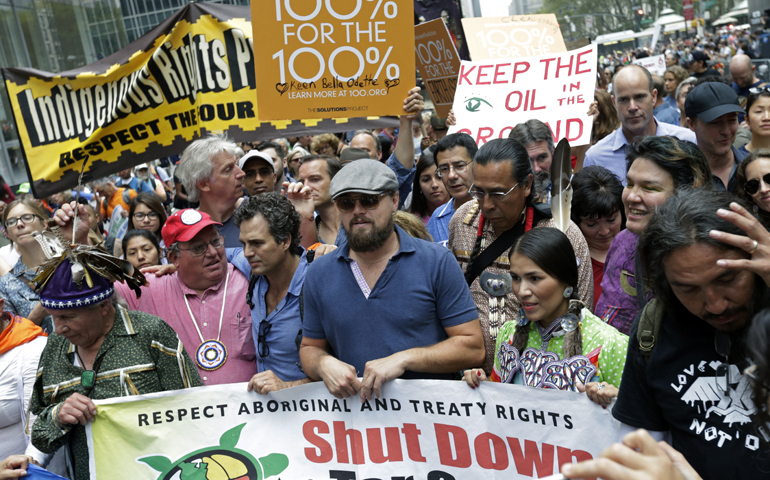
Actor Leonardo DiCaprio participates in the People's Climate March on Sunday in New York. (CNS/EPA/Peter Foley)
More than 300,000 demonstrators flooded the streets of midtown Manhattan on Sunday to draw awareness to climate change in the People's Climate March, now considered the largest climate change protest in history.
Faith leaders joined politicians, celebrities, musicians, labor unions, and tens of thousands of concerned citizens in the march. Demonstrators waved signs that read "Jesus Would Drive A Prius" and "System Change, Not Climate Change" as they snaked their way through the heart of New York City.
"We said it would take everyone to change everything -- and everyone showed up," Eddie Bautista, executive director of the New York City Environmental Justice Alliance, said in a statement.
The New York march coincided with demonstrations across the globe and was planned just ahead of the United Nations' summit on reducing carbon emissions.
Aside from drawing awareness to the climate crisis, demonstrators were drawn to the march for a variety of reasons. Many in the faith community, for example, felt a moral obligation to make their voices heard on the issue.
Steffano Montano, a theology professor at Barry University in Miami, said as a Catholic, there's a spiritual responsibility to combat climate change.
"By understanding creation, we can come closer to the Creator. It's an added spiritual responsibility," Montano told NCR. "Justice for the earth is something that affects everybody. It's going to affect my daughter, my grandkids. It affects the poor in ways we are still trying to come to terms with. And it's our fault. So that's why we're here. It's on us to make a difference."
Similarly, Franciscan Sr. Kathy Dougherty from the Sisters of St. Francis of Philadelphia said climate change is a life issue that desperately needs to be addressed.
"I certainly feel it's critical, the way corporate decisions are made that affect the environment, and I feel there's a need for a change. If we can't sustain the planet, human life is not going to be sustained; therefore, it's very much a life issue," Dougherty said.
For politicians who attended, the answers in the climate change fight lie in policy decisions.
Melissa Mark-Viverito, speaker of the New York City Council, said she believes policy decisions in New York City can have a transforming effect throughout the country.
"There are so many things that can be done. Obviously, cutting down on fossil fuels and incentivizing the use of solar and wind power, looking at construction moving forward -- how do you build greener more efficient buildings? Those are things we as a city council are looking at," Mark-Viverito said.
Policy changes in New York, she continued, can serve as a model for other cities looking to go green.
"As a city, we own a lot of city buildings; we have fleets of cars. There are things as a city we can get a handle on. We're really trying to put New York City on the map so it can serve as a model for other cities," she said.
But for Catholic organizers of the march, the solution lies in morality, not politics.
"I think of [climate change] as a moral issue," Patrick Carolan, executive director of the Franciscan Action Network, told NCR. "Part of the problem is we look at it as a moral and ethical issue, and we're looking for political solutions. We really need to be looking at moral and ethical solutions. The only solution as Christians is to follow the teachings of Jesus, where we look at all of God's creation as our brother and sister, as St. Francis did."
Hours before the march Sunday, Carolan addressed a crowded mass at St. Columba Church in the Chelsea neighborhood of Manhattan to spread word of faith-based action on climate change.
"Action is not going to come from people at the United Nations or down in Washington, D.C.," Carolan said during the speech. "Action is only going to come by people in pews standing up and saying, 'We want something done.' "
[Ben Feuerherd is a freelance writer in New York.]



